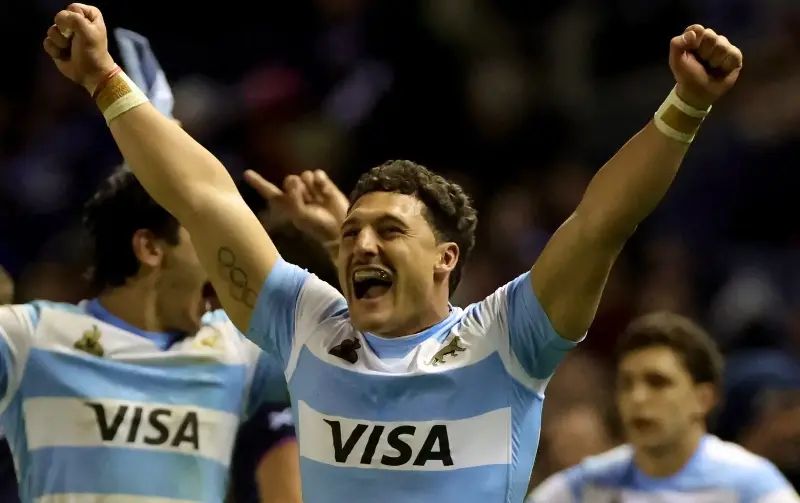
Powerful beasts tend to come out of Mendoza. The city and province in western Argentina, spitting distance from the Chilean border and the soaring Andes, is one of the world’s 11 Great Wine Capitals, famed for its malbec grape.
Wine connoisseurs will know that a malbec from Mendoza is not for the faint-hearted: robust, full-bodied and, often, punchy.
That tricolon aptly fits another of Mendoza’s finest exports, the Argentina wing, Rodrigo Isgró. Born in the city, the 26-year-old Harlequin has become, since his debut in 2023, one of the Pumas’ most lethal weapons.
Isgró’s path is one less trodden. Until his first taste of global rugby on the sevens circuit in 2019, the wing had never left Argentina. Now, his home is in south-west London and its environs where, he says, he has “grown up” as both player and person since arriving at Harlequins.
“It will be great to play against some of my team-mates [against England on Sunday],” Isgró says. “I speak with Marcus [Smith] every day and it will be fun.
“Nick Evans [Harlequins attack coach] is really good and he gives me confidence. My team-mates, too, have made me feel very welcome – we could do something very good. Marcus is a very good friend. He was really good when I arrived in England. He gave up a lot of time for me; as well as patience and understanding. My English was not very good – I didn’t speak it.
“Playing for Argentina [at sevens] was the first time I had left the country, my home. I am from Mendoza, but for the last three years I lived in Buenos Aires. It was hard [at the start, in London] because the language is different but I grew up a lot: both in my personality and on the field. But it was a really good challenge. I was scared before and now I am happy that I feel comfortable here.”
Mendoza might be 7,000 miles away from London, but Isgró has managed to create a home away from home. A malbec from Mendoza is his “favourite, a classic” and, thankfully for him, it is a grape which is ubiquitous in the UK. Less common, however, is that Argentine staple, mate – a hot, herbal drink made out of soaking yerba mate leaves in hot water – which he enjoys often with Smith. There are also regular rendezvous with the Argentine diaspora in London. Guido Petti, Pedro Delgado and Boris Wenger are also at Harlequins; Juan-Martín González and Lucio Cinti play for Saracens, while Agustín Creevy is still in the capital after his exploits with both London Irish and, latterly, Sale.
“Marcus drinks mate with me every day at Quins,” Isgró says. “We always have yerba in the hotel. It’s difficult to have it in England so we do not get it everywhere we travel, but some shops in town sell it.
“Agustin Creevy lives in Kingston and we meet at his home for a barbecue. Juan González and Lucio Cinti live in the north [of London]. The Argie players at Quins live in the south, in Guildford, and we meet at Creevy’s house.”
Isgró credits his parents, Eugenio and Marisa, as his great inspirations; his father an accountant, his mother a teacher. But there are other names, some of whom are inherently linked with Argentina’s rich rugby past. Federico Méndez, the former Northampton and Argentina front-rower who was once sent off at Twickenham for decking Paul Ackord, is a former Mendocino who coached Isgró when he was 15 and taught the wing the importance of the gym in the modern game. When you look at the size of Isgró‘s tree-trunk thighs, propping up a somewhat diminutive stature, it is clear to see that Méndez was on to something. Isgró punches far above his weight. In his teens, he became a “training fanatic”.
Another name that crops up in conversation is Michael Cheika, the former Pumas, Wallabies and Leicester coach. It was while Cheika was the Argentina coach, ahead of the 2023 World Cup, that he and then assistant Felipe Contepomi spotted Isgró’s XVs potential while the wing was playing sevens. Isgró was called into train ahead of the Rugby Championship, before making his full debut against Australia. That same year, Isgró was named World Rugby men’s sevens player of the year before his final outing in the shorter format, at the Paris Olympics.
“In 2023, after the sevens season, Michael Cheika called me into training for the Rugby Championship; him and Felipe gave me the confidence to play XVs,” Isgró says. “Then I played the World Cup, then back into sevens because we had the Olympic Games and I had been preparing for them for the last three years.
“The transition to XVs was really hard because they are two different games. The fitness is different, but now I feel OK, more confident.”
If Isgró brings that confidence to the Allianz Stadium on Sunday, England had better be on their guard.
